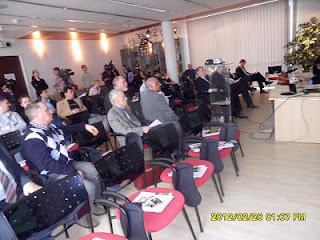Hungary: Racism must be
uprooted
Mátyás Szeli
 |
| Gibril Deen addressing the audience |
Cheer, don’t boo! – is the message of the conference
organised on the elimination of exclusion. The Hungarian Football Association (HFA) and the Mahatma
Gandhi Human Rights Organisation organised the conference “SPIN – Sport for
Social Inclusion and for the Elimination of Racism in Football”.
It would be hypocrisy to state that racism does not exist in
the world of sport in Hungary;
therefore the lectures given by HFA shed light on this serious problem, and
discuss it thoroughly from different viewpoints. Considering that on Monday
more than 10 people spoke at the event organised at the HFA headquarters, it
would be difficult to recap everything in detail that had been said, but
concentrating on the main points we try to summarise the most important learning
taken from the event.
Sándor Berzi, vice president of the Hungarian Football
Association presented the UEFA ten points that summarise the most basic
regulations against racism, emphasising prevention. The sport leader also
warned the audience mentioning the fines involved, that apparently for
supporter offences is a minimum of 20 000 Euro, players and officers proved
guilty may be banned from one to five matches, and another penalty can be the
closing of the playing field. Berzi pointed out that in every case so far in
which the clubs appealed, the sports court has given their consent to the
decision of the Association.
Péter Kovács, the security deputy director of HFA listed the
different forms of racism and imparted that in the last season eight frontline
clubs were fined for racist offences (mostly for booing at players with
coloured skin). In his opinion, the phenomenon is significant; however,
supporter feedback helps the work.
President of the fair play committee, György Szilágyi said that when
compiling the fair play ranking, among others the conduct of supporters is also
taken into consideration, thus in total DVSC finished first. The club director
for Debrecen
emphasised that the main problems (besides racism, cheatings in betting,
doping, supporter violence) cannot be stopped by football and its bodies
themselves only. Racism has its roots in society. This phenomenon discourages
players and families from entering the stadium. The objective is the
cooperation between all that play a role in football, raising awareness, as
well as encouraging the community to exclude those instigating hatred.
The club leader also shared his experiences in Debrecen, namely that
earlier there were banners with racist content, however, these became
suppressed. There are still some racist comments shouted occasionally, but the
situation is not serious. This is due to the organisational background of DVSC,
the banners are strictly checked, and the security leader has a good
relationship with the supporters, with whom he is in continuous correspondence.
Of course, the results of the club are also influential, good performance calms
down emotions.
 Gibril Deen, leader of Mahatma Gandhi Human Rights
Organisation is of the opinion that social inclusion can happen most through
sport – migrants not only have to be accepted, but integrated also, and good
sportsmen and women have to be acknowledged regardless of their skin colour.
The Organisation tries to reach its goals by organising football tournaments,
conferences, and cultural festivals. Sándor Hős, the director of the refugee
reception centre in Bicske agrees with the previous statement, emphasising that
there are a lot of talents among the refugees, six of them, for example, are
playing in the sports school in Felcsút - led by the former national player,
László Dajka – which gives sport opportunity for disadvantaged youth. Cultural
anthropologist, Ibolya Tomory has also come to the conclusion after her
experiences in East Africa that people of
different cultures accept each other easier in the sports field.
Gibril Deen, leader of Mahatma Gandhi Human Rights
Organisation is of the opinion that social inclusion can happen most through
sport – migrants not only have to be accepted, but integrated also, and good
sportsmen and women have to be acknowledged regardless of their skin colour.
The Organisation tries to reach its goals by organising football tournaments,
conferences, and cultural festivals. Sándor Hős, the director of the refugee
reception centre in Bicske agrees with the previous statement, emphasising that
there are a lot of talents among the refugees, six of them, for example, are
playing in the sports school in Felcsút - led by the former national player,
László Dajka – which gives sport opportunity for disadvantaged youth. Cultural
anthropologist, Ibolya Tomory has also come to the conclusion after her
experiences in East Africa that people of
different cultures accept each other easier in the sports field.
István Mezei, the chair of the Hungarian Roma Team that won
114 out of its 116 matches, also spoke and said that the attitudes of the sport
leaders is very important and that HFA gave enormous help to the team. Maccabi VAC president, Ádám Jusztin talked
about the fact that Jewish professional sportsmen and women in Hungary have
been really successful in the past, but nowadays most of them do not disclose
their origin. The Foreign
Policy, JHA and Human Rights Attaché of the British Embassy,
Levente Nyitrai gave insight into the British situation, mentioning that
regarding the latest cases even the political elite raised their voices saying
that they will eliminate the problem all the way to its roots.




















No comments:
Post a Comment